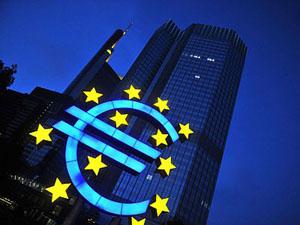Protesters stand vigil outside European Central Bank, critical of treatment of Greece
Outside the European Central Bank in Frankfurt, tall bank towers surround a small courtyard where Occupy protestors have camped out for the past few months.
Around 50 people stand warming their hands at fires in trash cans, while a small video screen shows images of protests. Then a man named Ted Gaier gets up to explain the impact of the austerity measures in Greece. Gaier is a member of Schwabinggrad Ballett, an activist arts group based in Hamburg that has staged street performances on gentrification and globalization in the past.
Now the group’s focus is Greece.
“The most necessary thing is to broadcast this kind of alternative view of what is happening in Greece,” Gaier said.
The ‘alternative’ view that Gaier and his group are presenting is that average Greeks are not to blame for the current economic crisis there. He said this contradicts what he often hears in the German media — that Greeks wouldn’t be in this situation if they just worked harder.
Many Germans resent that their government will have to come up with the lion’s share of a European bailout package for debt-strapped Greece. The Schwabinggrad Ballett wanted to portray a broader perspective, so they decided to go to Greece.
“We spoke with neighborhood activists, we spoke with unionists, filmmakers, policemen,” Gaier said.
They wanted to hear the Greek people’s story, but instead, Gaier said they often found themselves being quizzed by Greeks about Germany’s approach to the debt crisis.
“It didn’t stop,” he said. “Every taxi driver, you had to have this conversation.”
Now that the group is back in Germany, the conversation doesn’t seem much more harmonious.
The music outside the European Central Bank is a mix of protest sounds recorded in Greece. The Schwabinggrad members wear signs saying things like, “Poverty – Made in Germany,” and “Hands Off People’s Property in Greece.”
Some people in business suits stand on the steps of the bank, looking puzzled by the performance.
Ross Williams, a British man heading home after work, said the performance is just a lot of noise.
“It seems crazy, a lot of swearing. Yeah, it seems mad,” Williams said.
But does this make him think about Greece in a different way?
“No, I think they’ve been bailed out a lot of times now. I think they need to sort themselves out,” Williams said. As for the performance art in front of the bank, “I don’t know what they’re achieving, really.”
Others took a more positive view. Elisabeth Hahn, who works in the arts in Hamburg, came specifically to see the show. She likes the setting of the performance – under the golden light of the ECB’s Euro sign – and she likes that the group connected with Greek activists.
“I think it was very good that some engaged critical thinking person went to Athens to participate in what was going on there as Germans,” she said. “It’s not so easy to solve the economical problems of Greece.”
But Hahn thinks the arts group could have made their performance more accessible to a broader audience.
“If I look around at the people participating here, I think, okay, they are interested but they were interested before. It’s the usual left thinkers,” Hahn said.
Still, Gaier maintains that this performance does more than preach to the converted.
“In this case, I really think there are not so many converted anyway, because with us on the left, people are not so interested in economics, in general,” he explained.
Gaier said solving the euro crisis is complicated, of course, but he wants more activists to become educated about the topic.
So even if the Schwabinggrad Ballett’s performance isn’t heard by those inside the European Central Bank, he hopes it will at least educate those camped out front.
